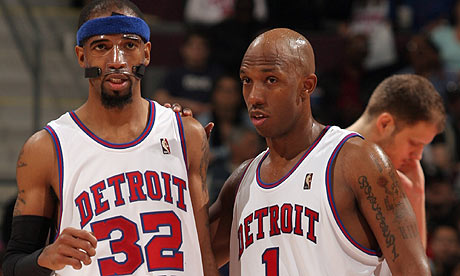Tuesday, March 8, 2011
Defensive Ability
I was recently sent a really nice article on statistics in basketball. It captures the history of the movement, but also some current fundamental issues. What it fails to do, however, is address what I will call the "Second Generation" of such analysis in the N.B.A. I fundamentally believe the problem in analysis lies in the type of data we are currently collecting. When one thinks about the box score, one realizes that it is really a type of behavioral coding system. A certain behavior occurs (e.g., player A passes the ball to player B, who quickly makes a shot without dribbling or moving too much) and a tick mark occurs on the box sheet (e.g., player A receives one assist). The problem with the box score as it is currently constituted is that it relies too heavily on discrete, positive outcomes (e.g.., player A receives no credit if player B misses his shot, regardless of the beauty of the pass) and it is relatively unsophisticated. The author in the aforementioned article ends by saying that quantitative analysis will never replace a human watching basketball footage, which is certainly true, because the data analyzed in quantitative analysis are almost entirely based on a human watching basketball footage. What the author fails to see is that this footage can be analyzed (and quantified) in more sophisticated ways, which will (likely) lead to better and more sophisticated models. It will be harder to make such a system than the extant box score (a made shot is a discrete event, but who is to say whether a post-move is "good" or not?) but if made, I believe it will launch us into the Second Generation of basketball analysis. With that in mind, I would like to develop a relatively basic coding system for defensive ability. Something simple, but better than the number of blocks, number of steals, or adjusted +/-. I would like to use this coding system for the rest of the season, see if it correlates with established metrics of good defense (e.g., opponents' shooting percentage, opponents' points/possession, etc.), and to let you, dear readers, to join me for the ride. Any takers?
Monday, March 7, 2011
Hollinger, you win again!
I was intrigued by Hollinger's claim that performance against top teams has nothing to do with playoff success, so I put it to the test. I used a linear regression in which playoff success (total playoff wins) was the dependent variable and win total from the regular season, point differential, and wins against the top three teams were loaded as independent variables. First, win total from the regular season correlated very highly with point differential, but as far as the prediction model went, win total from the regular season outperformed point differential. Lastly, performance against top teams made no difference either way, as Hollinger stated. I would be interested to see this done over a few different years so as to gain more power in the analysis and see if the Hollinger claim holds. Interesting results, but inconclusive.
Saturday, March 5, 2011
Thursday's Top Ten
I know it's not Thursday, except in the middle of Antarctica, but I thought that we should keep the title of our "weekly" feature. Hopefully we'll be getting this up with a far greater frequency in the future.
1. Probably this week's biggest story was the Heat's two huge losses. First, they had Orlando completely dead in the water and then let them go on an 18-0 run. Here's the recap.
2. There's a big time debate in basketball as to what matters: your ability to play well against top teams or how big the point differential is between points your team scores and the points of your opponents? Holistic minded analysts who write about heart and drive tend to think the former matters most, whereas number crunchers stake their reputations on the latter (and, not surprisingly, the numbers usually, but not always back them up). Who's right? Well, both groups could agree the Heat's embarrassing 30 point loss to the Spurs probably means the Spurs are better, WAAAAAY better.

3. Why are the Heat so bad? Well in the Spurs game they were totally outgunned: in fact, Tim Duncan could be seen on the sidelines saying "Game Over" after the first quarter. But in the Magic game, they had a shot at it and ran a play for Bosh to hit a three for the tie. Here's a post suggesting the Heat are less than spectacular in the final moments of a game, contrasting them with the Suns.
4. In non-Heat news, Phil Jackson continued his plot to try and get one of his players to kill him so that he could finally rest in peace and his wife could collect the insurance money (or whatever he's up to), by saying that Ron Artest runs the Lakers' offense better than Kobe.
5. These new Nuggets are pretty awesome. Plus, they have a totally new identity. Just check out the box score for their game against the Bobcats. They collectively scored 120, but no player scored 20. Talk about a 7 headed snake (that's what you were talking about right?).
6. The NBA played it's first game in Europe. Unfortunately for them, the teams playing were the Raptors and the Nets, who had a combined record of 34-88 before suiting up. I can't link to footage of the game (which the Nets won easily) because it's still too painful to see Deron Williams in a Nets' uniform. So instead I'll give you a story about an NBA exec saying he's not sure the NBA will return. I'm sure the people of London (deprived of the Lakers, Spurs, Heat, Magic, Celtics, Bulls, Mavericks, and every other non-Toronto, New Jersey, Cleveland, or Detroit based team) will thank you.

7. My favorite article I read this week involved the New York Times' Nate Silver breaking down actual monetary value of NBA players based on average league salary (and not the artificial price ceiling of the player cap). If I'm reading him correctly, Carmelo signing with the Knicks means that Obama is cruising towards reelection.
8. The final reverberations of the craziest trade deadline ever were felt as the Celtics' signed Troy Murphy, the Mavericks signed Corey Brewer, and the Heat signed Jason Biggs. Here's some analysis of the buy-outs that involved these and some lesser players.
9. In the fictional universe of this post, in which the date is still Thursday, March 3, this messed up situation in Detroit still counts as having sort of happened this week. Man, those halcyon days of the '04 Piston taking on the spoiled Hollywood superstars had to end like this. Hunted down by assassins, Chauncey Billups is the sole survivor of a once great clan. He must figure out who is doing the hunting and avenge his fallen brethren before it's too late. Metaphorically that is. The assassins represent becoming a total unmitigated prick.

10. Finally, in home news. We should have another podcast for you soon. In advance, you're welcome.
1. Probably this week's biggest story was the Heat's two huge losses. First, they had Orlando completely dead in the water and then let them go on an 18-0 run. Here's the recap.
2. There's a big time debate in basketball as to what matters: your ability to play well against top teams or how big the point differential is between points your team scores and the points of your opponents? Holistic minded analysts who write about heart and drive tend to think the former matters most, whereas number crunchers stake their reputations on the latter (and, not surprisingly, the numbers usually, but not always back them up). Who's right? Well, both groups could agree the Heat's embarrassing 30 point loss to the Spurs probably means the Spurs are better, WAAAAAY better.

3. Why are the Heat so bad? Well in the Spurs game they were totally outgunned: in fact, Tim Duncan could be seen on the sidelines saying "Game Over" after the first quarter. But in the Magic game, they had a shot at it and ran a play for Bosh to hit a three for the tie. Here's a post suggesting the Heat are less than spectacular in the final moments of a game, contrasting them with the Suns.
4. In non-Heat news, Phil Jackson continued his plot to try and get one of his players to kill him so that he could finally rest in peace and his wife could collect the insurance money (or whatever he's up to), by saying that Ron Artest runs the Lakers' offense better than Kobe.
5. These new Nuggets are pretty awesome. Plus, they have a totally new identity. Just check out the box score for their game against the Bobcats. They collectively scored 120, but no player scored 20. Talk about a 7 headed snake (that's what you were talking about right?).
6. The NBA played it's first game in Europe. Unfortunately for them, the teams playing were the Raptors and the Nets, who had a combined record of 34-88 before suiting up. I can't link to footage of the game (which the Nets won easily) because it's still too painful to see Deron Williams in a Nets' uniform. So instead I'll give you a story about an NBA exec saying he's not sure the NBA will return. I'm sure the people of London (deprived of the Lakers, Spurs, Heat, Magic, Celtics, Bulls, Mavericks, and every other non-Toronto, New Jersey, Cleveland, or Detroit based team) will thank you.

7. My favorite article I read this week involved the New York Times' Nate Silver breaking down actual monetary value of NBA players based on average league salary (and not the artificial price ceiling of the player cap). If I'm reading him correctly, Carmelo signing with the Knicks means that Obama is cruising towards reelection.
8. The final reverberations of the craziest trade deadline ever were felt as the Celtics' signed Troy Murphy, the Mavericks signed Corey Brewer, and the Heat signed Jason Biggs. Here's some analysis of the buy-outs that involved these and some lesser players.
9. In the fictional universe of this post, in which the date is still Thursday, March 3, this messed up situation in Detroit still counts as having sort of happened this week. Man, those halcyon days of the '04 Piston taking on the spoiled Hollywood superstars had to end like this. Hunted down by assassins, Chauncey Billups is the sole survivor of a once great clan. He must figure out who is doing the hunting and avenge his fallen brethren before it's too late. Metaphorically that is. The assassins represent becoming a total unmitigated prick.

10. Finally, in home news. We should have another podcast for you soon. In advance, you're welcome.
Subscribe to:
Posts (Atom)
